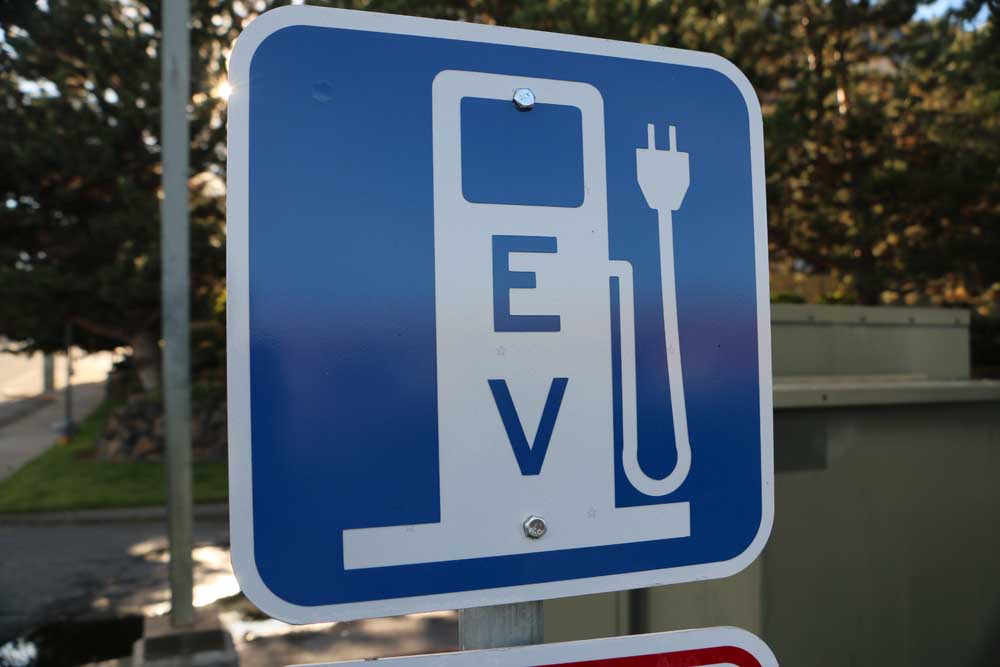Bend climate change committee stresses need to work with all
Published 12:00 am Saturday, June 9, 2018

- Electric charging station signs like this one are what electric car drivers look for to find an electric vehicle charging station. (Dan Weig/Bulletin file photo)
A committee developing a plan to make Bend a greener city says success requires support from all facets of the community.
Bend’s Climate Action Steering Committee, which has representatives from the business sector, the environmental community and other local governments will spend the next year developing a plan to reduce fossil fuel use in Bend by 40 percent by 2030 and 70 percent by 2050. It’s an ambitious goal and one that some community members and city councilors worry could cost too much to achieve.
Bend City Councilor Bruce Abernethy, one of two committee liaisons from the City Council, said he hoped Bend could find a way to use methods that have succeeded in other cities and lead the way with other approaches. National efforts to combat climate change have slowed under the Trump administration, and Abernethy said cities like Bend can lead sustainability efforts.
“I’d like Bend to be an incubator,” Abernethy said. “There are some communities that have done things before that we’d like to try. As of right now, things aren’t happening at the national level so they’ll have to happen at the local level.”
A few of Abernethy’s fellow councilors have been apprehensive about the city contributing to efforts to fight climate change.
Mayor Casey Roats voted against the city’s climate resolution two years ago but warmed to the idea of the plan after seeing how energy saving initiatives in city buildings saved city money. He voted to form the city’s climate committee, but Councilor Justin Livingston voted against the committee.
Committee members said during a meeting Thursday that they needed to work on ways to communicate benefits of the climate action plan to residents who might feel like Roats and Livingston.
Al Spector, a member of the committee who lobbied Republican and Democratic politicians in Washington, D.C., to weatherproof houses for low-income people, said the committee should focus on communicating in ways that resonate with Bend residents. Some might want to hear about preserving land and air for future generations; some may want to leave a legacy for their grandkids, and some may respond to keeping the forest healthy to provide good hunting grounds, Spector said.
“There is an opportunity to look beyond what drives us or motivates us,” Spector said. “So much magic is in the messaging and opening ourselves to making the case in a way people relate to.”
Russ Donnelly, a committee member who heads Bend’s chapter of the Citizens Climate Lobby, said the group needs to be careful of playing into a perception that a “war on cars” exists in Bend. While developing policies to reduce fossil fuel use, the committee needs to respect those people who choose to drive and who don’t have options other than driving.
“It’s an easy wedge issue, but if we hit it head-on and get out in front of it, I think we can do a good job,” Donnelly said.
Others stressed the need to make sure the plan serves all members of the community and doesn’t have a disproportionate impact on low-income residents.
This drive occurs even as committee members suggested far-reaching initiatives to meet the city’s climate goals. A.J. Skidmore, a committee member, seventh-grader at Cascade Middle School and the son of Bend Assistant City Manager Jon Skidmore, said he’d like to see Bend eventually use 100 percent renewable energy, add more electric car charging stations and institute a local tax on carbon.
“It would make fossil fuels more expensive while making renewables cheaper,” he said.
The next committee meeting will be in August, once an inventory of greenhouse gas emissions within city limits is complete.
— Reporter: 541-633-2160; jshumway@bendbulletin.com






